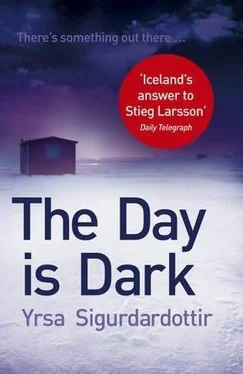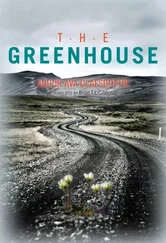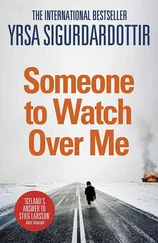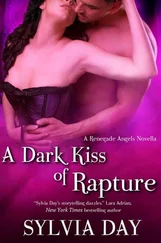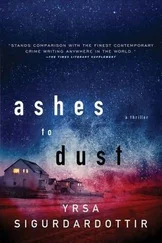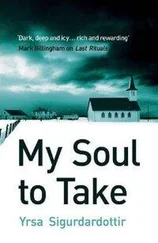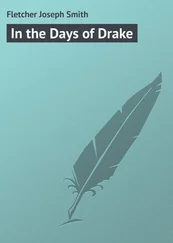Matthew hung up and handed Thóra the slip of paper. ‘Are you able to ask her whether there’s something wrong with this number? I can’t reach anyone.’ Thóra asked and the woman checked the number. She handed it back to Thóra, saying that as far as she could tell there was nothing wrong with it. However, it was sometimes difficult to get a good connection and he should just keep trying. Matthew then asked Thóra to ask whether it were conceivable that the phone had been disconnected. The woman reddened a little at this question but then said that the authorities paid a fixed telephone service fee and that the phone was fine. Matthew continued trying.
Thóra turned back to what they had been discussing before Matthew interrupted. ‘How did this woman die? Did she need blood, or did she have a blood disease?’ It crossed Thóra’s mind that the words ‘blood test’ in Oddný Hildur’s notebook were perhaps connected to Usinna. Perhaps she had needed blood tests, but transportation problems had prevented her from being treated in time. With this in mind, it was possible that Naruana blamed foreigners for his sister’s death, although Thóra found that difficult to believe.
Oqqapia frowned, bewildered, and the facial movement appeared to cause her pain. She grabbed her jaw and stroked her swollen skin. ‘She didn’t die because of anything to do with blood. She just went missing.’
Thóra thought for a moment. ‘Where did she go missing?’
‘In your area. She went there despite being warned not to. I would never go there.’
‘And then what? She went and just didn’t come back? Did no one search for her?’
‘She left in the morning and when she didn’t return in the evening it was clear that there was no hope of her returning the next day. It was pointless to look for her although Naruana and his father did try. She was gone.’
‘Doesn’t anyone find it odd that people keep disappearing around here?’ Thóra was dumbfounded. What was going on? She didn’t know enough about the environment in these parts to imagine the main dangers people faced. She thought of avalanches and polar bears, but both were things it would have been easy to discuss in simple terms, instead of going on about the area being ‘cursed’ or ‘evil’.
Thóra’s question clearly irritated Oqqapia. ‘Of course we do. That’s why we don’t go there and we try to warn others not to. That was the first thing I learned as a small child.’
‘I didn’t mean everyone who lives here, I meant the police and other authorities. Don’t they make enquiries when people disappear?’
The woman shook her head and gave Thóra a puzzled look. ‘How would they hear about it?’
At the other end of the sofa Matthew sighed and took a break from his attempts to contact the police. It was perhaps not surprising that people round here were disinclined to report missing persons.
‘So was the death of this woman never reported?’ Thóra asked.
‘I don’t know. Maybe. I didn’t live with Naruana at the time.’ She licked her lips again but the blood had stopped flowing. Perhaps the memory of the violence was starting to heal as well. ‘We got together after all of this had happened. He was on the street and I had inherited this house from my mother.’ She saw from Thóra’s expression that she didn’t think much of the arrangement, and added: ‘He sometimes works down at the dock and comes home with seals and fish.’
This man would have to contribute a lot more to the household if Thóra were to allow him to even so much as rent her garage, but this perhaps more than anything else shed light on their different circumstances. ‘How many people have disappeared up there?’
‘Not many. I don’t remember anyone else but Usinna and then your people. We’re careful to keep away from the place, so there’s never any activity there. Tourists hardly ever come here.’
‘What about the daughter of the hunter that you told me about. This Igimaq?’ Every wrinkle in the man’s face was engraved on Thóra’s mind; eyes that were so brown they were nearly black, and his maimed hand. Usually she had a lot of difficulty remembering people’s faces.
‘Usinna was Igimaq’s daughter. Naruana is his son.’
So they were one and the same person. ‘What do you think is going on? Do you believe that the souls of the people who died of starvation all those years ago are killing others?’ That couldn’t be it. The bank’s performance bond wouldn’t be saved by an explanation like that.
‘Yes, I do. It’s an evil place, but exactly what happens I don’t know, nor do I want to. Maybe the spirits drag people into the rock or transform them into animals. Those kinds of things happen here. Maybe not in your country, but they do here.’
‘I think there is a different, more down-to-earth explanation.’ Thóra wished that Matthew could understand them. He would certainly be less irritable about the phone if he could follow the discussion. She felt for him and knew that she would personally have started beating the receiver on the arm of the sofa in anger if she were in his shoes. ‘How did Usinna end up going to the area if it’s instilled in everyone from childhood to avoid it? And what was she actually doing there?’
‘She had probably forgotten it was dangerous. She moved away from here as a teenager, went to school in Nuuk, and from there to Copenhagen for college. She was really clever.’
‘So she was just visiting?’
‘She didn’t come often – maybe once a year. She was fond of the village and the people here even though everyone knew that she would never move back again. When she went missing, she was doing some kind of research related to the mine. I think it was in biology.’
Usinna had been doing research in this locally notorious area? Thóra tried to ask her questions carefully for fear of belittling the folklore in which Oqqapia seemed to believe. ‘Was she studying polar bears or something else that could have led her to the forbidden area?’
Oqqapia shook her head and looked indignantly at Thóra. ‘No, she was studying births here in the village and another village farther north of here.’
‘Births?’ There were hardly many of those out on the snow-banks around the work site. ‘Human births?’ Thóra’s Danish wasn’t good enough for her to know what words were used for animal litters. It could well be that the research had involved seals or other mammals.
‘Yes. No boys have been born here for many, many years. She wanted to find out why.’
Thóra thought this over for a moment. It suddenly occurred to her that they had only seen girls out and about in the village. Of course it could have been a coincidence, but she found no reason to doubt the woman’s statement. ‘Did Usinna have a theory about the reasons?’
‘No doubt, but I don’t know what it was.’ The woman stared at her lap. ‘I’m not going to have children, so I don’t really care what the explanation is.’
Matthew slammed down the receiver and turned to Thóra. ‘Do you have the notebook? I’m going to try the number in there.’ Thóra pulled the book from the pocket of her coverall, which lay partly on the sofa. They hadn’t been invited to take them off; nevertheless Thóra had unzipped hers and pulled off the top part. Matthew lifted the receiver and dialled the number. He suddenly smiled victoriously. ‘It works. It’s engaged, though.’
‘Who is he calling?’ Oqqapia had been watching them but hadn’t understood what they’d said to each other. Thóra reached for the open notebook and handed it to the woman. She pointed to the number and asked whether she recognized it. Oqqapia did not reply immediately, then asked, suspiciously: ‘Where did you get this number?’
Читать дальше
